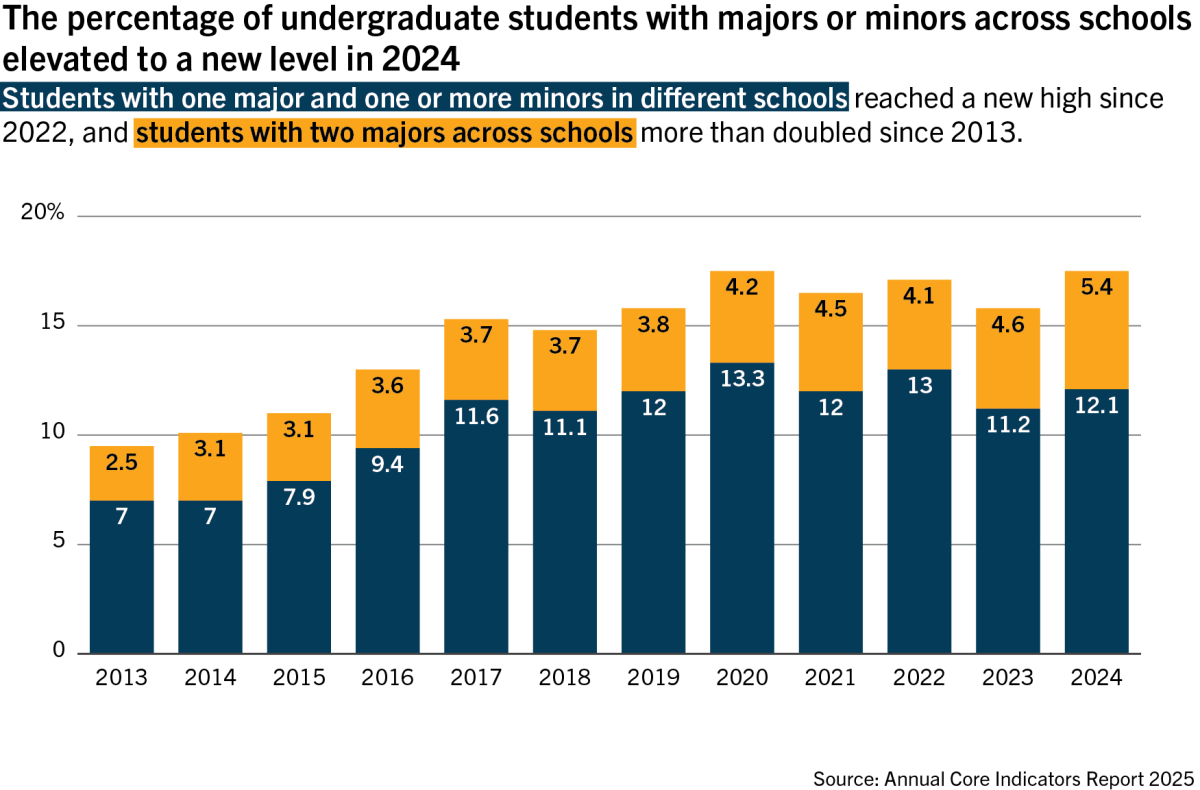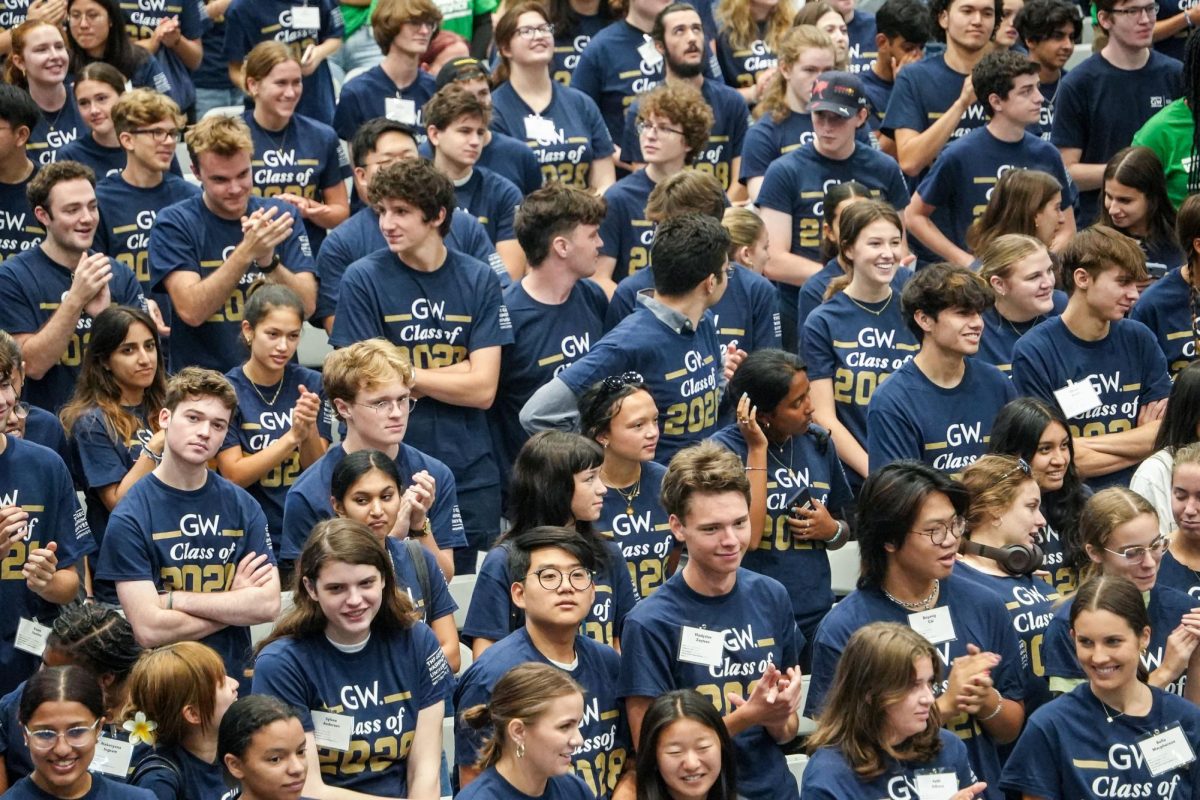The number of undergraduate students studying across multiple schools rebounded this year after a dip in 2023, reaching the highest number recorded since 2013, according to the University’s annual core indicators report.
The report — which Provost Chris Bracey presented at the Faculty Senate meeting earlier this month — states that 17.6 percent of undergraduate students at GW’s five residential colleges declared a major or minor in more than one school in 2024, compared to 15.8 percent of undergraduates in 2023. The number tops the previous highest record of cross-school students at 17.5 percent in 2020, as well as the amount of cross-school students on a given academic year at GW dating back to at least 2013, the first year of available data, when just 9.5 percent of students studied across schools.
University spokesperson Julia Garbitt said the University evaluates and adjusts program offerings to meet student demand and the University’s strategic goals. She said the University plans to continue to “focus on and prioritize” ensuring students may participate in multiple academic programs.
“We are pleased to see the increase in the number of students studying across schools, a feat we can attribute to consistent efforts,” Garbitt said in an email. “We look forward to continuing these efforts moving forward.”
Garbitt said the University generated this year’s report using “refined methodology and updated data sources and coding process.” She said the report also includes a “very small” number of students who are receiving an associate of arts degree through the GW Early College Program, but officials may limit the data to only students pursuing bachelor’s degrees in future years.
“The current version should be more accurate and reflect that the numbers are the undergraduate students from the five residential colleges and schools,” Garbitt said in an email.

Experts in higher education said the cross-school studying trend may be the result of students seeking to stand out to future employers.
Liz McCarthy, an academic adviser and the assistant director of the Cross-College Advising Service at the University of Wisconsin-Madison, said the current job market, in which people frequently change professions, may make students think they need to have knowledge and expertise in multiple disciplines to have a flourishing career.
“Our students coming up now have seen the job market, what that looks like,” McCarthy said. “They’ve seen their peers go into different careers and not stay in those careers very long, which is normal now. And so I could imagine them thinking, ‘Oh, I need to have knowledge in two or three different areas to be really successful in the job market.'”
She said students might have a perception that employers want multiple interdisciplinary majors or minors, but they are actually more concerned with students having skills that apply across roles.
“If we talk to employers out there, it’s not so much, ‘Does that student have a double major?’, or ‘Do they have a certificate or a minor with it?'” McCarthy said. “But it’s really looking at those skills that they’re coming in with and are they trainable.”
Tina Lynn Evans — a professor of sustainability studies at Colorado Mountain College who has researched ways to integrate interdisciplinary studies into sustainability teaching — said students may be seeking a more interdisciplinary education because they are “paying attention” to world issues, like climate change and political unrest.
She said students might feel that they need a “broader perspective” to address these issues as they enter the workforce, adding that students’ personalities or ambitions are also factors when students decide to study across disciplines.
“The L.A. fires that we recently had would have to do with climate science and city planning and resilience and recovery and psychology and the sociology of community capital, social capital and all kinds of different things could be brought to bear on that particular challenge and in a real immediate way,” Evans said.
Students said interests they have outside of their majors drove their decision to take majors and minors across schools, which allow them to add new skills and refine a potential career path.
Emad Qureshi, a first-year double majoring in music and marketing, said studying across schools has allowed him to balance his passion for music with his family’s demands that he pursues a stable career.
“My hobby is music. I love doing music, so that’s the one I wanted to do,” he said. “But with the family I come from, music’s not enough, so I was kind of forced into a major that would lead to a guaranteed career or somewhat guaranteed career after college.”
Sophomore Maria Szamrej, who double majors in international affairs and economics, said she feels it is particularly helpful and common for students in the Elliott School of International Affairs to take a major or minor in another school because international affairs doesn’t have a “set career path.”
“It’s really important for Elliott students to have something else just to like, kind of narrow down, like future career options,” Szamrej said.
Abeeha Fatima, a first-year majoring in marketing and minoring in criminal justice, said studying across schools has diversified her educational path by allowing her to “learn and benefit” from the greater GW community.
She said ensuring she is not falling behind in her minor or major “stresses” her out when taking a majority of her classes at the School of Business or the Columbian College of Arts & Sciences in a particular semester. When taking more business classes in a semester, she feels she is “leaving behind” criminal justice, Fatima said.
“I feel like having the option to choose between different courses expands your knowledge as well, and then you just learn more overall,” Fatima said.
Kathleen Clay, a senior majoring in international affairs and double minoring in history and criminal justice, said pursuing a degree across schools has broadened her perspective on education and life. She said she decided to pursue her minors because she might look into attending law school.
“I knew I wanted to major in international affairs, but as I was taking classes and when I was finishing up my major, I started to think of things or topics I was actually interested in,” said Clay.





